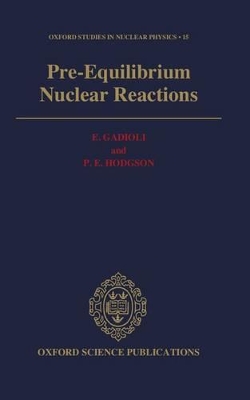Oxford Studies in Nuclear Physics
1 primary work
Book 15
When a projectile and a target nucleus interact, creating a composite nucleus, the energy initially concentrated on a few nucleons spreads through the composite nucleus, which evolves towards a state of statistical equilibrium. During this equilibriation process, nucleons, or aggregates of nucleons, having considerable energy, may be ejected.
This book gives a comprehensive and up-to-date account of the experimental and theoretical research that has been devoted, during the past 25 years, to the study of these pre-equilibrium reactions. After a historical introduction the theories of the reactions are described in detail. The multistep compound and multistep direct theories are considered separately, and all the theories are extensively compared with experimental data. A detailed account of compound-nucleus reactions is also included, together with a review of the theories of the nuclear-level densities that are needed to evaluate pre-equilibrium cross-sections. The main emphasis of the book is on nucleon-induced reactions, but those due to composite particles and heavy ions are also considered.
This book gives a comprehensive and up-to-date account of the experimental and theoretical research that has been devoted, during the past 25 years, to the study of these pre-equilibrium reactions. After a historical introduction the theories of the reactions are described in detail. The multistep compound and multistep direct theories are considered separately, and all the theories are extensively compared with experimental data. A detailed account of compound-nucleus reactions is also included, together with a review of the theories of the nuclear-level densities that are needed to evaluate pre-equilibrium cross-sections. The main emphasis of the book is on nucleon-induced reactions, but those due to composite particles and heavy ions are also considered.
